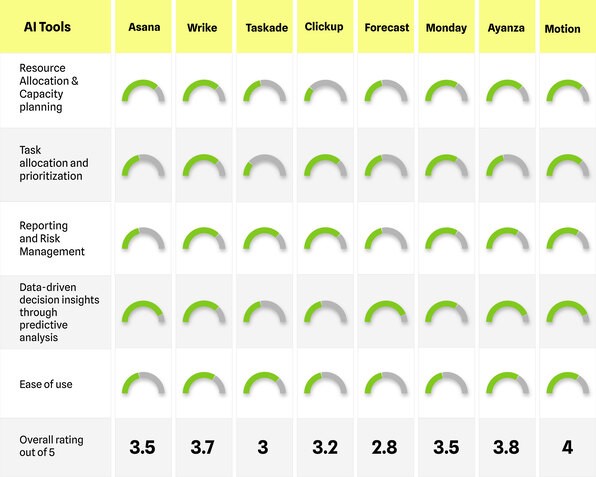Srikanth Kancharla
Managing Consultant | Senior IT Program Manager , Hong Kong
Artificial Intelligence
An average of 25-75% of software development and digital transformation projects fail – and this failure results in firms losing around $109 million for every $1 billion invested in projects and programs.
These projects primarily fail when requirements related to cost, schedule, quality, transparency, and reporting aren’t met – and it’s project managers, regardless of industry or domain, who play a crucial role in addressing these issues and ensuring successful project delivery.
In recent times, there has been a revolution in artificial intelligence (AI), with the integration and utilization of AI tools for various project-related tasks significantly helping PMs.
The following factors are key drivers for the adoption of AI in project implementation:
Project managers can now optimize their time by using AI for tasks such as generating reports, conducting predictive analysis, and managing risks – thereby improving overall project outcomes.
According to a survey conducted by ResearchGate, over 60% of project managers remain hesitant when it comes to leveraging AI – and this is due to limited understanding of AI technologies, and challenges in selecting the most suitable AI applications for their specific use cases.
The following will help PMs determine how AI can be effectively utilized on their projects:
Automated resource planning – Project managers spend a substantial amount of time resource planning, depending on the size of the project. AI helps to plan resource allocation based on project scope, thereby maximising productivity and saving the PM’s time. AI also helps to map people’s skillsets.
Capacity planning and forecasting – Traditionally PMs utilise excel spreadsheets to come up with capacity planning and budget and forecasting. With the help of AI, this will be completely automated. Based on the trends of historical data and patterns, AI tools can provide budget estimates as well.
Task allocation and prioritization – Allocation of tasks to employees is one of the key responsibilities of any PM – and this is one of their most time-consuming jobs, both in agile and waterfall delivery models. AI tools help to automate the allocation of tasks depending on the job type, i.e. development/testing/design, etc.
Reporting and risk management – Reporting on a project’s progress is important to keep stakeholders updated and show transparency, highlighting any risks or issues. This activity has always been manual. With AI, even reports can be automated, offering insights into project status, progress, and areas requiring attention – presenting even intricate data in a user-friendly format.
Data-driven decision insights (through predictive analysis) – AI's capability to store and process project data, along with its capacity to learn from past outcomes, enhances overall predictability. As AI refines its algorithms continuously, it provides increasingly precise forecasts for resource requirements and task durations, leveraging insights from various factors observed in prior projects and performances. This continuous enhancement in predictive analytics enables project managers to anticipate outcomes and pinpoint potential issues more effectively.
The demand for AI tools in project management is slowly gaining more and more traction and attention, driving number of companies to invest in automating and improving project management related tasks and processes.
Even though there are number of tools currently available, below are some of the best of them.

All the above tools have their respective pros and cons. Depending on the project requirement and the scope and necessity of automation, budget, and ease of use – management can decide on which tool to choose by referring to the above table.
In addition to the above tools, Synechron Nexus AI products, Synechron Codifai and Synechron Verifai, are primarily aimed at streamlining timelines, reducing costs, and automating practices throughout the software development lifecycle; project managers can achieve optimal project delivery outcomes from start to finish, from planning and development, right through to project delivery.
Since PMs can directly leverage AI capabilities for repetitive and tedious tasks, they can then concentrate on other responsibilities, such as managing teams and resources, and fostering emotional and social intelligence to understand how individuals feel and perform. This brings additional energy and motivation to a team – an area where AI doesn’t currently have a role to play in projects.
According to Gartner, by 2030, 80% of project management tasks are projected to be automated. AI though will not completely replace project managers; rather, PMs will need to adapt and evolve by integrating new technologies and ways of working, leveraging AI tools in their respective domains.
Before investing in the latest AI solutions, it's crucial to evaluate your company's current state. Identify potential barriers and take proactive measures to address them. While ignoring AI can leave you trailing behind your competitors, investing without proper preparation may bring more challenges than solutions.
Despite concerns about data privacy, digital ethics, and information security in AI utilization, adapting to these technologies is essential in order to streamline projects and avoid failures. AI provides project managers with the data needed to anticipate issues, forecast appropriate budgets, set accurate deadlines, and take proactive steps to ensure their projects run more smoothly.
More information on Synechron’s AI capabilities can be found here.